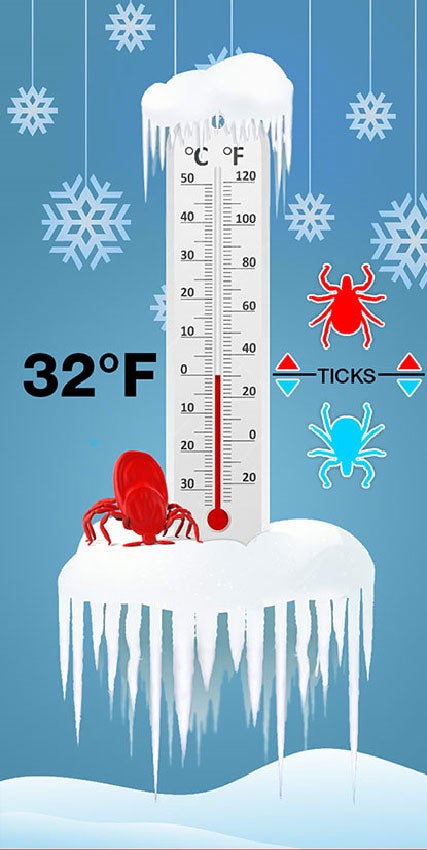Can’t believe TICKS might still be active in winter? Well, BELIEVE!!
Blacklegged (deer) tick adults are not killed by freezing temperatures. Even in the coldest regions of North America, these ticks can still be active on days when temperatures are above freezing and they’re not covered over by snow. But here’s the deal; it’s most likely to happen if the ground is thawed AND the temperature is above freezing. Deer ticks sitting for a time on a block of ice (or frozen ground) just can’t muster the energy to move their muscles. Warm them up, even just a little, and watch out…they’re good to go. And they will, too.
Loaded with pathogens, especially in the Northeast and upper Mid-West, adult stage female deer ticks can give you Lyme disease, babesiosis, anaplasmosis, and possibly a relapsing fever or a deer tick (Powassan) virus. Always do a quick TickCheck daily, especially from your waistline and up – front and back. In one study, 63% of adult ticks were found attached on the head, neck and upper torso. While this tick’s preferred host may be white-tailed deer, they’ll readily latch onto people and pets, too.
To avoid an unexpected tick bite while working or recreating outdoors in winter, check the ground to see if it’s unfrozen and check the temperature to see if it’s above freezing. If you answer yes to both conditions, then you may be at risk for a blacklegged tick encounter. So, be sure not to forget about being TickSmart, even in winter.
Top Winter TickSmart Actions:
- Wear tick repellent clothing treated with permethrin, especially your pants.
- Tuck in your shirt.
- Perform tick checks, looking for adult ticks, after outdoor work or play.
- Throw clothes in a hot dryer for 5-10 minutes *before* washing to kill any lingering ticks that may be attached to work clothing.
- Report any ticks found either biting or loose to TickSpotters, America’s crowd-sourced tick survey.
- Continue protecting your pet; you never know when a thaw will allow the ticks to become active again.

Also, it’s important for folks living or visiting more southerly and West Coast regions, where temperatures are mostly above freezing, to remember that certain types of ticks remain active all winter – blacklegged ticks (Ixodes scapularis) in the south, western blacklegged ticks (Ixodes pacificus) along the west coast, brown dog ticks (Rhipicephalus sanguineus) especially in the southern tier of states from east to west, and starting in February, Rocky Mountain wood ticks (Dermacentor andersoni) in lower elevations of the Mountain region.
